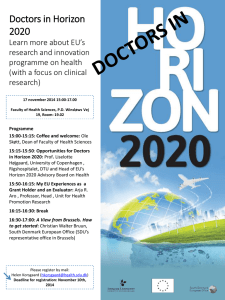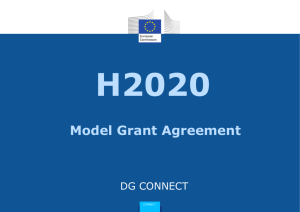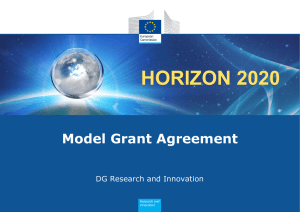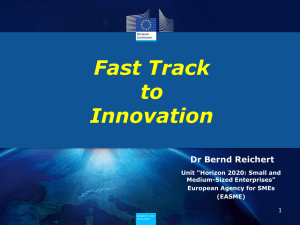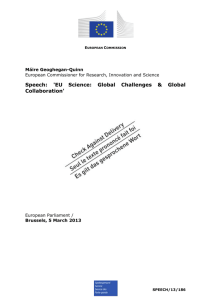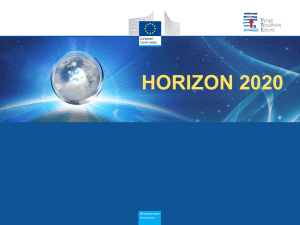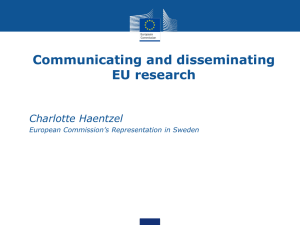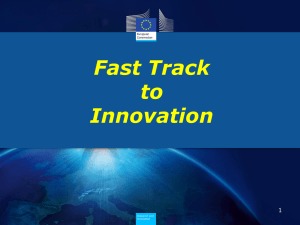Horizon 2020 Update on legal, financial and policy matters for research managers
advertisement
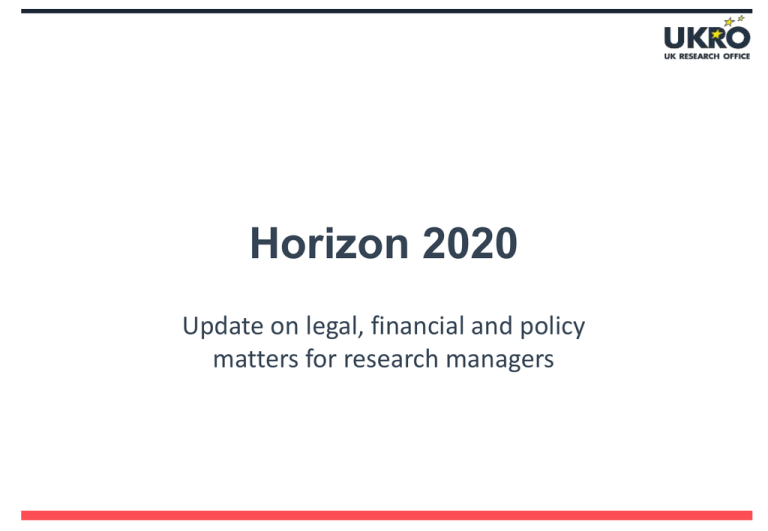
Horizon 2020
Update on legal, financial and policy
matters for research managers
Planned changes to the MGA (1)
• Commission plans to introduce important changes to the MGA:
– Article 4.2 'Budget transfers' aimed at increasing the budget flexibility for
beneficiaries by allowing transfer of amounts between different forms of costs
within the direct personnel costs.
Beneficiaries that opted in for using unit costs for the calculation of personnel
costs can now easily switch back to actual costs (without an amendment), even if
this form of costs was not originally envisaged in the GA.
Change would apply retroactively without a need for amendment.
Planned changes to the MGA (2)
• Commission plans to introduce important changes to the MGA:
– Article 6.2.A 'Direct personnel costs' (the so called 'last closed financial year')
aimed at offering the possibility of monthly calculation of the hourly rates.
NEW! “As an option, the beneficiaries may choose to calculate the hourly rate per
month instead of full financial year. Beneficiaries choosing this option must
calculate the hourly rate as follows:
{{actual monthly personnel cost (excluding additional remuneration) for the
person divided by number of annual productive hours / 12}}”
Planned changes to the MGA (3)
• Commission plans to introduce important changes to the MGA:
– Article 6.2.A 'Direct personnel costs' (the so called 'last closed financial year')
aimed at offering the possibility of monthly calculation of the hourly rates.
NEW! “For parts of basic remuneration generated over a period longer than a
month, only the share generated in the month can be included in the monthly
personnel costs. This applies irrespectively of the amount actually paid for that
remuneration in the month.
Each beneficiary must apply only one option (per full financial year or per month)
for all the duration of the action.”
Questions
• Changes will be included in the Feb/March update of MGA
• UKRO was consulted on these changes and shared preliminary
information with subscribers, including the University of Warwick.
• Input received was communicated to EC who are now ‘digesting’ it.
• No update since then and, at this stage, there are still more questions
than answers:
– How will the changes affect projects that have already had their first reports
submitted?
EC states that changes will not apply to past reporting periods, so beneficiaries
might end-up with two ways of reporting personnel costs on one project.
Planned changes to the MGA
• Commission plans to introduce important changes to the MGA:
– Article 34 'Ethics and Research Integrity' in order to render the different
aspects of research integrity more visible and concrete to the beneficiaries.
NEW!: “Beneficiaries must respect the highest standards of research integrity:
• honesty;
• reliability;
• objectivity;
• impartiality;
• open communication;
• duty of care;
• fairness and
• responsibility for future science generations”
Impact on beneficiaries
• Changes introduced are in line with Council conclusions on RRI from
December 2015, which were one of the research priorities of the
Luxembourgish Presidency of the EU.
• While RRI is not a novelty in Horizon 2020, codification in the MGA
means that EC might impose financial penalties in case of noncompliance.
• Details of monitoring by EC remain unknown.
Planned changes to the MGA
• Commission plans to introduce important changes to the MGA:
– Article 48 'Suspension of payments' in order to extent the possibility for the
Commission/Agency to suspend the payment of the balance only for one or
several beneficiaries (and not necessarily for all).
– Articles 48 'Suspension of payments', 49 'Suspension of the action
implementation', and 50.3 'Termination of the Agreement or the participation
of one of more beneficiaries by the Commission/Agency' to allow for
confidentiality reasons, in case of audits, reviews, investigations etc., the
Commission/Agency will carry out the contradictory procedure directly with
the beneficiary concerned (the coordinator will be informed).
Fewer disruptions for consortium as a whole
EU R&I policy developments impacting on
Horizon 2020
• Commissioner Carlos Moedas will announce details of the
European Innovation Council in mid-February.
– No specific plans for the EIC just now and it can take any form,
from an advisory body to an ERC-like funding agency for
innovation-related activities in Horizon 2020.
– FET Expert Advisory Group calls for the EIC to have a significant
FET component, but nothing has been decided yet.
– Initial stakeholder meetings took place in late 2015 and an open
consultation will be launched on 16 February.
• Submit a contribution!
EU R&I policy developments impacting on
Horizon 2020
• Interim evaluation of Horizon 2020
– The next ‘big thing’ in Horizon 2020
– Must be completed by 31 December 2017 with peak of evaluation
activities in late 2016/ early 2017
– Commission currently calling for experts to determine the
methodology, which will be used to evaluate the Programme
– Evaluation will include open consultation on the changes that
should be made to Horizon 2020 after 2017.
• Submit a contribution!
– Stay up to date with latest UKRO articles
EU R&I policy developments impacting on
Horizon 2020
• Interim evaluation of Horizon 2020
– Will include significant simplification exercise of Horizon
2020, since the Commissioner now wants to make the
Programme even simpler, especially for newcomers.
– Commission launched a ‘Simplification survey’ last
October, but it failed to identify the next ‘big thing’ that
could be simplified!
• Any ideas? Let me know by next Monday!
EU R&I policy developments impacting on
Horizon 2020
• UKRO survey on the new Portal
– Your feedback matters!
– Links available on the UKRO Portal
• BIS survey on the impact of FP7-funded projects
– ICF Consulting on behalf of BIS have launched an online survey on
the impact of FP7 projects on academia, industry, etc. in the UK.
– Link available on the UKRO Portal (please disseminate within the
University) and also sent directly to researchers participating in
FP7 projects.
EU R&I policy developments impacting on
Horizon 2020
• Next programming period
– Commission wants next Horizon 2020 programming to cover
period 2018-2020 with a three-year Work Programme
– Member States prefer 2+1 option, as it allows for better alignment
of priorities for funding with emerging challenges, such as
economic and migration crises.
Claiming Tuition Fees
• The tuition fees of PhD students working on an FP7/H2020 project
can be charged where they are considered as a foregone cost to the
institution, provided all other conditions for cost eligibility are met
• If a student is exempt from paying tuition fees, these fees can be an
eligible cost provided the student's contract specifically mentions
the waived fee amount. The full salary, including the waived fee,
must be recorded in the universities' accounts
• Tuition fees are reported under personnel costs in this case. The fee
amount needs to correspond to the published rates (on the
institution's website). It is recommended that the tuition fee is
transferred from the project account directly to the university
department collecting fees on the student's behalf. There has to be
a clear audit trail for the payment .
Claiming Tuition Fees
• The eligible cost is not the tuition fee itself, but the waived
amount included in the student's contract as part of their
remuneration. Where the fee is waived for the student, it is
considered that the institution is financing the fee which would
have otherwise been a real cost to the student, had the
institution not agreed to the payment on their behalf as part of
the employment package
• Where a student is not working 100% on the project, only the
respective share can be charged to the project and timesheets
are necessary
References
The relevant references can be found in the FP7 Guide to Financial
Issues and the Horizon 2020 Annotated Model Grant Agreement:
• For FP7: "Forgone (lost) academic fees for post graduate students:
Academic fees may be due by post-graduate students. Sometimes,
in cases of work performed by the student for the university, the
student may be exempt to pay (part of) the fee. This forgone
income for the university is eligible as personnel cost when there
is a labour contract with the student in which the amount is
indicated. The other conditions of Article II.14.1 of the ECGA have
to be fulfilled as well."
References
• For Horizon 2020 : "Remuneration of post graduate students
employed by the university (beneficiary) — Like any personnel
costs, PhD costs (i.e. personnel costs of students) are eligible, if
they fulfil the conditions set out in Article 6. In this context,
fellowships/scholarships/stipends are assimilated to salaries
provided that this remuneration complies with the application
national law on taxes, labour and social security. Furthermore, the
assignment of tasks must respect the laws in force in the place of
establishment of the beneficiary and the persons must have the
necessary qualifications for the performance of the tasks
attributed to them in the context of the H2020 action."
UKRO Annual Conference 2016 - Save the date!
30 June – 1July 2016
Glasgow
Thank you
